Published 12:43 IST, June 26th 2024
Bombay High Court Rejects Students' Plea Against Ban on Hijab, Burqa, Naqab in College
The Bombay High Court has rejected a plea filed by nine female students challenging ban on burqa, hijab enforced by NG Acharya and DK Marathe College, Mumbai.

Bombay High Court Rejects Students' Plea Against Ban on Hijab, Burqa, Naqab in College | Image:
PTI/Representative
- Listen to this article
- 3 min read
Advertisement
12:43 IST, June 26th 2024




